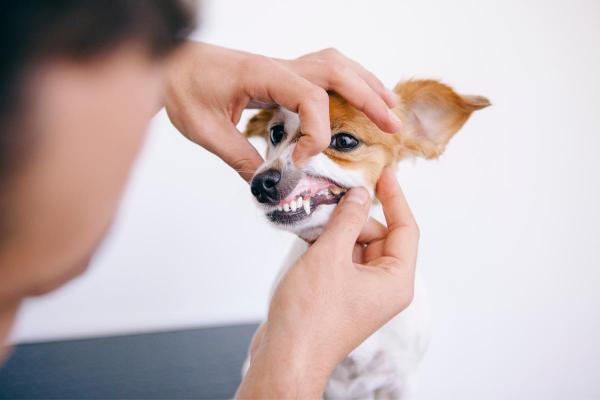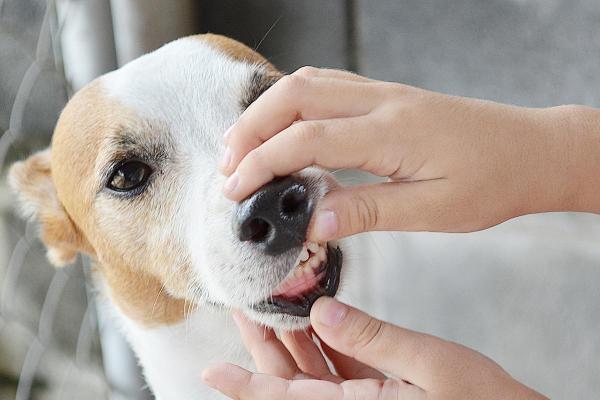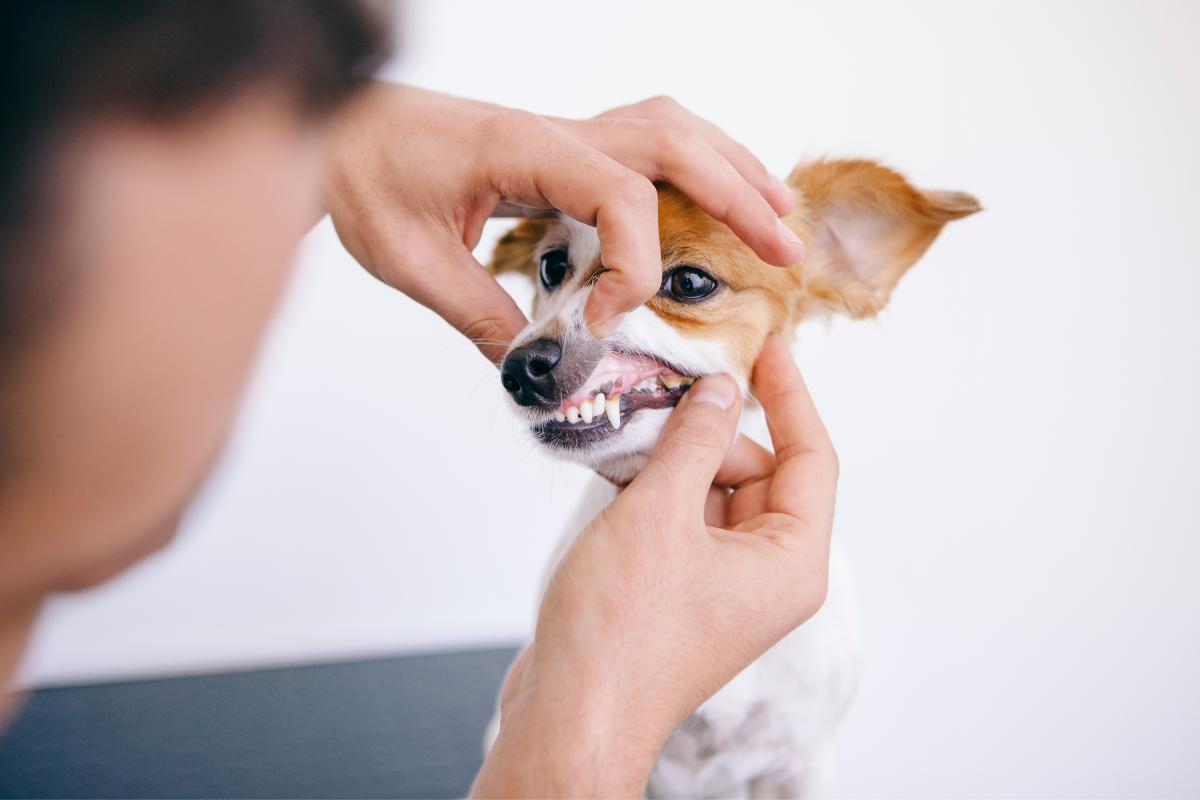How to Relieve Tooth Pain in Dogs?



See files for Cats
Tooth pain in dogs is a common problem that can cause discomfort, irritability, and even affect their overall health. Dogs use their teeth for a variety of purposes, from eating to playing, and as such, they are prone to dental issues just like humans. Tooth pain in dogs can be caused by a range of factors, from gum disease to tooth decay and even dental injuries. As pet owners, it's essential to recognize the signs of tooth pain in our dogs and know how to alleviate their discomfort.
In this AnimalWised article, we'll explore the causes of tooth pain in dogs, its symptoms, and how to treat and prevent dental issues in our beloved pets.
Causes of tooth pain in dogs
Tooth pain is a common problem that affects dogs of all ages and breeds. Just like humans, dogs can experience dental issues that can cause pain and discomfort in their teeth and gums.
Although many pet owners may consider dental disease in their pets as primarily a cosmetic issue, the truth is that dental disease can also cause pain and discomfort for animals.
Tooth pain in dogs can be caused by a variety of factors, including:
- Dental plaque and tartar buildup: over time, plaque, and tartar can accumulate on a dog's teeth and cause inflammation in the gums (gingivitis). Left untreated, gingivitis can progress to periodontitis, which is a more severe form of gum disease that can cause tooth loss and pain.
- Malocclusion: dogs with misaligned teeth or an abnormal bite may experience tooth pain due to pressure on certain teeth or jaw bones.
- Trauma: trauma to the teeth can be caused by accidents, falls, fights with other animals, or chewing on hard objects. The trauma can result in a fracture or crack in the tooth, exposing the sensitive inner layers and causing pain.
- Tooth infections: tooth infections occur when bacteria enter the tooth through a crack or cavity and infect the pulp, which is the innermost layer of the tooth. This can lead to an abscess, which is a painful pocket of pus that forms at the root of the tooth.
- Teething: just like humans, puppies go through a teething phase where their baby teeth fall out and are replaced by adult teeth. This process can be uncomfortable and painful for puppies, and they may experience sore gums and teeth.
- Foreign objects: dogs are known to chew on and swallow all sorts of things, such as bones, sticks, toys, and even rocks. If these objects get stuck in the teeth or gums, they can cause irritation, inflammation, and infection, leading to tooth pain. Additionally, some objects can cause damage to the teeth or gums, such as fractures or cuts, which can also lead to pain.
If left untreated, tooth pain can lead to more serious health problems, so it's important to seek veterinary care if your dog is showing signs of dental pain.
You might be interested in this other article, where we explain how many teeth dogs have.
Signs of tooth pain in dogs
Identifying tooth pain in dogs can be difficult since they cannot communicate their discomfort directly. However, there are several signs and symptoms that can indicate your dog is experiencing toothache.
The manifestation of dental pain in dogs can vary significantly, depending on factors such as the intensity of pain and the individual personality of the dog. However, some common symptoms of tooth pain in dogs include:
- Decreased appetite
- Drooling
- Pawing or rubbing at the mouth or face
- Bleeding or inflamed gums
- Bad breath
- Changes in chewing habits, such as chewing on one side of the mouth or avoiding hard food
- Whining or crying when eating or drinking
- Lethargy or reduced activity level
- Swelling around the face or jaw
- Tooth discoloration or visible damage
If your dog is displaying any of these symptoms, it is important to take them to a veterinarian for an evaluation. The veterinarian can perform a thorough examination of your dog's teeth and gums and recommend a treatment plan to alleviate their tooth pain.

How to relieve tooth pain in a dog?
If you suspect that your dog is suffering from tooth pain, it is crucial to take them to the vet for a proper evaluation. It is not recommended to medicate your dog with over-the-counter painkillers or assume that the cause of the pain is due to a tooth problem without a proper diagnosis. Some dental issues may require systemic antibiotics, anti-inflammatories, or even tooth extraction, which only a vet can diagnose and treat.
Nevertheless, there are several steps you can take to alleviate your dog's tooth pain. Here are some recommendations:
- Soft toys or chews: although these may not completely eliminate tooth pain, they can help relieve it, especially for puppies who tend to bite everything. This will also prevent them from chewing on other objects that may damage their teeth.
- Food dispensing toys: you can fill these toys with cold or frozen food (make sure it does not harm them) to help reduce inflammation and relieve tooth pain. This type of toy, like KONG, also keeps your dog entertained.
- Chamomile, Aloe Vera, or Lavender: these medicinal herbs have calming properties that can help your dog feel more comfortable. However, it's important to consult with your vet to determine the correct dose and administration method.
- Dental cleaning: if your dog's tooth pain is caused by dental disease, a professional dental cleaning may be necessary to remove the tartar and bacteria causing the pain.
In summary, it's best to seek professional help from a veterinarian for any concerns regarding your dog's dental health. Along with their guidance, these recommendations can aid in reducing your dog's discomfort and prevent further damage to their teeth.
How to treat tooth pain in dogs?
The treatment for tooth pain in dogs depends on the underlying cause of the pain. The first step is to take the dog to the veterinarian for a proper diagnosis. The veterinarian may perform a physical examination, dental X-rays, and blood work to determine the cause of the tooth pain.
- Cavity or infection: if the tooth pain is caused by a dental issue such as a cavity or infection, the veterinarian may recommend a dental cleaning, scaling, and polishing, and possibly a tooth extraction. The dog may also be prescribed pain medication, antibiotics, or anti-inflammatory medication to alleviate pain and reduce inflammation.
- Systemic disease: in cases where the tooth pain is caused by a systemic disease, such as a bacterial or viral infection, the veterinarian may prescribe antibiotics or antiviral medication to treat the underlying condition.
It is important to follow the veterinarian's recommended treatment plan and attend all follow-up appointments to ensure the dog's tooth pain is properly managed, and any underlying conditions are effectively treated.
Can you give Metamizole or dipyrone to a dog with toothache?
It is not recommended to give Metamizole, also known as Dipyrone, to a dog with toothache without consulting with a veterinarian first. While this medication is commonly used to treat pain and fever in humans, it can be toxic to dogs in certain doses.
Additionally, there may be underlying health conditions that are causing the toothache, which can be better addressed through a proper evaluation by a veterinarian. Therefore, it is essential to seek professional guidance before administering any medication to a dog with tooth pain.
Home remedies to avoid tooth pain in dogs
Preventing tooth pain in dogs is essential for their overall health and well-being. Here are some home remedies that can help in maintaining your dog's dental health:
- Regular Brushing: brushing your dog's teeth regularly can prevent tooth decay, gum disease, and other dental problems that can lead to tooth pain. Use a soft-bristled toothbrush and a toothpaste designed for dogs.
- Diet: a healthy and balanced diet can promote healthy teeth and gums. Feed your dog high-quality dog food that is rich in vitamins and minerals. Avoid giving them table scraps, sugary or starchy foods, or bones that are too hard.
- Chew Toys: chewing on appropriate toys can help your dog clean their teeth, remove plaque, and strengthen their jaw muscles. Look for toys made of rubber or nylon that are durable and not easily broken apart.
- Raw Bones: raw bones can be a great way to clean your dog's teeth and promote dental health. However, be sure to supervise your dog when they are chewing on bones, and never give them cooked bones that can splinter and cause serious injuries.
- Coconut Oil: coconut oil has antimicrobial properties that can help prevent tooth decay and gum disease. Rub a small amount of coconut oil on your dog's teeth and gums or add it to their food.
Remember, home remedies can only do so much, and it is still essential to take your dog for regular dental checkups with a veterinarian.
Do not miss this other article where we explain how to properly clean your dog's teeth.

This article is purely informative. AnimalWised does not have the authority to prescribe any veterinary treatment or create a diagnosis. We invite you to take your pet to the veterinarian if they are suffering from any condition or pain.
If you want to read similar articles to How to Relieve Tooth Pain in Dogs?, we recommend you visit our Medicine category.
- Baia JD, Lemos RS, Moreira AB, Gioso MA Periodontal disease in dogs: review of the literature. Electronic Scientific Archives, 2017, vol.10(5). Available at https://sea.ufr.edu.br/SEA/article/download/320/pdf/1864. Consulted on 01/03/2023.
- Santos NS, Carlos RSA, Albuquerque GR Periodontal disease in dogs and cats: review of the literature. MedVep – Scientific journal of veterinary medicine – Small animals and pets, 2012, v.10(32). Available at https://medvep.com.br/wp-content/uploads/2020/06/Doen%C3%A7a-periodontal-em-c%C3%A3es-e-gatos-revis%C3%A3o-de- literature.pdf. Consulted on 01/03/2023.







